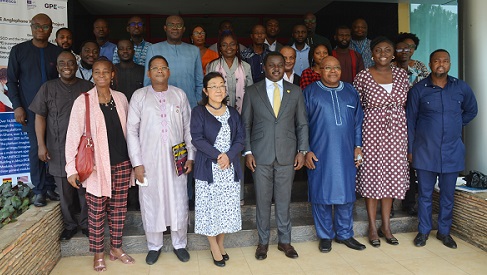- Login to ASPnet | Ghana Commission for UNESCO | Government Agency Responsible for the coordination of Ghana's contributions to and presence at UNESCO
We’ll make education system resilient to withstand crisis – NtimFordjour

????????????????????????????????????
The United Nations Educational, Scientific and Cultural Organisation (UNESCO) is organising a two-day experience sharing workshop to provide a unique platform for stakeholders in the education sector.
The workshop which started yesterday was to evaluate and exchange ideas on how to sustain the gains made through UNESCO-Global Partnership for Education (GPE) Anglophone West Africa COVID-19 Education Response Project.
It is also aimed at supporting five Anglophone countries in West Africa namely, Ghana, Nigeria, Liberia, Sierra Leone and The Gambia in their COVID-19 education sector response.
It was also to support them through adaptation, scaling and rapidly deploying a regional platform for distance and blended learning, strengthening regional co-operation and pooling resources for the development and diversification of educational resource while training teachers and relevant educational personnel.
The Deputy Minister of Education, Rev. John NtimFordjour, said the project adds up to several other UNESCO projects being implemented in Ghana which were contributing immensely to the Government’s efforts at integrating Information Communication Technology (ICT) into the education system at all levels.
According to Rev.Fordjour, the Emergency Remote Training (ERT) had equipped many teachers with basic skills in using online tools to facilitate teaching and learning more effectively and also trained them with skills to enable them facilitate teaching and learning remotely.
He noted that over 3,200 teachers have also been trained within the last three months by Centre for National Distance Learning and Open Schooling (CENDLOS)on a regional platform known as the ‘imaginelearning’.
“It is also gratifying to note that the UNESCO-GPE project is building on the already established partnerships and collaborative efforts with our national institutions particularly CENDLOS, which is the institution mandated by the Government of Ghana to facilitate the integration of ICT into the educational system across board,” he said.
The Deputy Minister said government was determined to make the education system very resilient to withstand any unforeseeable crises in future and assured of its commitment to collaborate with UNESCO and other development partners to enable Ghana achieve the Sustainable Development Goal (SDG) four of ensuring inclusive and equitable quality education and promote lifelong learning.
Head of UNESCO Office Ghana, Abdourahamane Diallo, said there were gaps inthe educational system that needed to be addressed.
He said many teachers were yet to be supported to acquire basic digital literacy, there were also weak quality assurance of content that are being rolled out by organisations, adding that many communities outside national capitals have very poor access to internet connectivity while the cost of data was high.
He said learners with disability and children from poor/rural areas do not benefit equally, this according to him could be attributed to inadequate ICT in education policies and legal environments.
“UNESCO is committed to addressing some of these gaps in Ghana through some interventions. UNESCO is supporting the government to review its ICT in Education Policy and is developing ICT Competency Framework for Teachers,” Mr Diallo said.
BY JEMIMA ESINAM KUATSINU – Ghanaian Times
